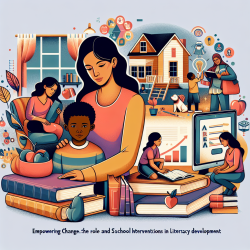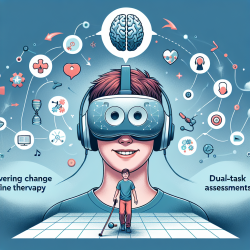Introduction
The challenges faced by health systems in conflict zones are immense, as highlighted by the recent research on the impact of COVID-19 in Syria. This study provides invaluable insights for speech-language pathologists and other healthcare practitioners working in similar environments. By understanding the systemic hurdles and the strategies employed to overcome them, practitioners can enhance their service delivery and outcomes, even in the most challenging circumstances.
Key Findings from the Research
The study titled Coronavirus 2019 and health systems affected by protracted conflict: The case of Syria highlights several critical issues:
- Fragmented Health Systems: Syria's health system is divided into multiple governance structures, each with varying capacities and resources. This fragmentation complicates the coordination and allocation of resources.
- Overcrowding and Poor Sanitation: Overcrowded living conditions and inadequate water, sanitation, and hygiene (WASH) facilities exacerbate the spread of COVID-19, presenting significant public health challenges.
- Vulnerability of Detainees: Detainees in overcrowded and unsanitary conditions are particularly at risk, highlighting the need for targeted interventions.
- Need for Rapid Capacity Building: There is an urgent need for capacity building in health systems and staff training to manage the pandemic effectively.
Implications for Speech-Language Pathologists
For speech-language pathologists working in conflict-affected regions, the findings from Syria offer several lessons:
- Adaptability: Practitioners must be adaptable and prepared to work within fragmented systems. Understanding local governance and resource allocation can improve service delivery.
- Focus on Hygiene and Safety: Ensuring that therapy environments are as hygienic as possible is crucial. Practitioners should advocate for improved WASH facilities in therapy settings.
- Targeted Interventions: Special attention should be given to vulnerable populations, such as children in detention centers, to provide them with necessary speech therapy services.
- Capacity Building: Continuous professional development and training are essential to equip practitioners with the skills needed to navigate complex health systems.
Encouraging Further Research
The challenges highlighted in the study underscore the need for further research into effective strategies for delivering speech therapy in conflict zones. Practitioners are encouraged to engage in research initiatives that explore innovative solutions and share best practices for overcoming systemic barriers.
Conclusion
The insights from Syria's health system during the COVID-19 pandemic offer valuable lessons for speech-language pathologists working in similar environments. By understanding and addressing the unique challenges of conflict-affected regions, practitioners can enhance their service delivery and improve outcomes for children and other vulnerable populations.
To read the original research paper, please follow this link: Coronavirus 2019 and health systems affected by protracted conflict: The case of Syria.










